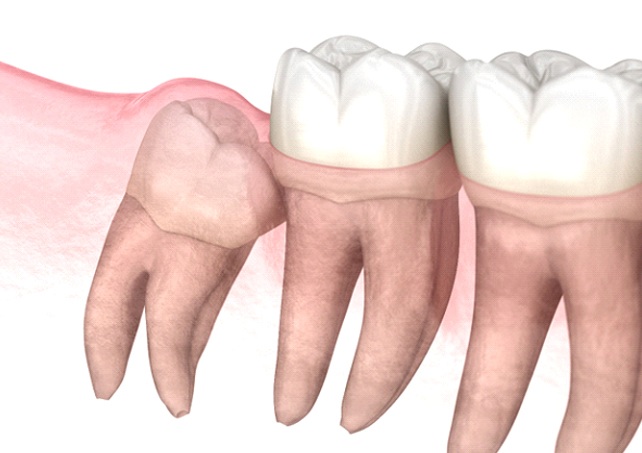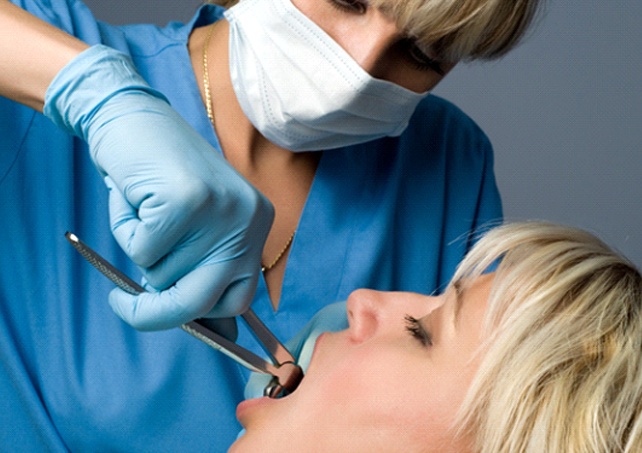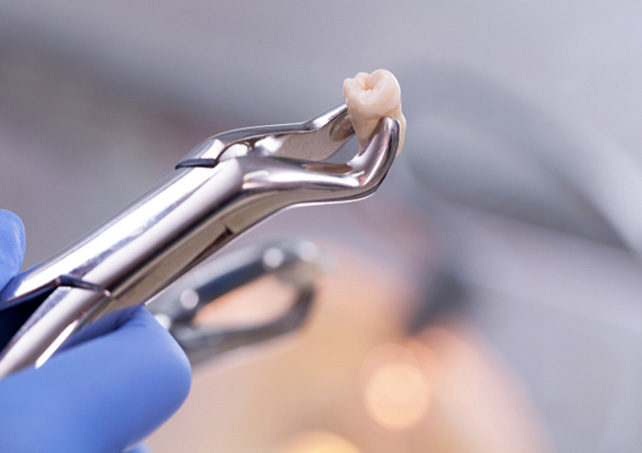Tooth Extractions – Virginia Beach, VA
Remove Dental Pain and Protect Your Oral Health
No adult ever wants to lose a tooth, but there are circumstances when it is the best or even only option with your oral health in mind. Neglecting a badly decayed, damaged, or infected tooth can lead to even more pain and major problems later on. To save your smile from teeth that are past the point of no return, Dr. Asra Javeed is your dentist in Virginia Beach who can perform a quick and comfortable extraction. Read on or contact our office today to learn how this common dental treatment can remove dental pain and protect your oral health.
Why Choose Smile Care Family Dentistry for Tooth Extractions?
- Many Dental Insurance Plans Accepted
- Same-Day Appointments Available
- Experienced And Kind Dentist
Reasons Why Tooth Extractions Are Necessary

At Smile Care Family Dentistry, we only recommend tooth extractions when all other options have been considered. Dr. Javeed will first evaluate your tooth to determine if it can be saved through root canal therapy, a dental crown, or other restorative treatment. However, a tooth extraction may be the best solution if you have:
- Severe dental infection that could spread to adjacent teeth
- Impacted wisdom teeth
- Overcrowded smile that prevents orthodontic treatment
- Extensive tooth decay or damage
- Advanced gum disease or jawbone deterioration
The Process of Removing a Tooth

There are two primary methods for tooth extractions in Virginia Beach: simple and surgical. If your tooth has fully emerged from the gums, Dr. Javeed will use forceps to gently rock it back and forth until the tooth naturally separates from your gum tissue. Your mouth will be numbed before the extraction begins to ensure your comfort.
Surgical extractions are typically performed on an impacted wisdom tooth or a tooth that has not erupted. In this case, she will make a small incision in the gums to reveal more of it. Next, the entire tooth is pulled out or cut into smaller pieces that are removed one by one.
The only way to determine which tooth extraction method will be required is to schedule a consultation at our office. Dr. Javeed will carefully evaluate your damaged or decaying tooth and create a custom removal plan based on your unique needs.
Tooth Extraction Aftercare

After your tooth is extracted, it’s important you return home and rest. Dr. Javeed will provide you with personalized aftercare instructions to ensure a successful recovery. Common aftercare tips include:
- Avoid eating hard, crunchy, sticky, sour, and spicy foods for about a week.
- Avoid drinking through a straw, as the suction could dislodge the protective blood clot that forms over the extraction site.
- Do not smoke, chew, or vape tobacco.
- Take over-the-counter or prescription pain medication as directed by your dentist.
- After 24 hours, mix warm water with half a teaspoon of salt and rinse your mouth gently.
- Keep your mouth clean by brushing and flossing carefully plus rinsing with mouthwash gently. Don’t use mouthwash with alcohol.
You may experience swelling or light bleeding immediately after your tooth extraction. This is completely normal and not a cause for alarm. You can manage any mild discomfort by taking pain medication as directed or applying an ice pack to your cheek. If your discomfort doesn’t dissipate after a couple of days or gets worse, contact our office right away.
Understanding the Cost of Tooth Extractions

When you’re told that you need to have a tooth removed, one of the first questions you’re likely to have is, “How much will it cost?” The answer won’t be exactly the same for everyone, and it’s important to remember that dental insurance and financing can help you manage your out-of-pocket costs. Our team will always be transparent with you when it comes to the amount you can expect to pay for your treatment, and we’ll be happy to answer any questions you might have.
Factors That Can Affect Tooth Extraction Cost

When putting together an estimate for tooth extraction, first we need to consider which teeth need to be removed. Obviously, the number of teeth makes a difference, but the location often matters as well. Front teeth, for example, are typically easier to remove than the back teeth, so an extraction involving the front teeth doesn’t normally cost as much.
We’ll also need to think about what comes after the extraction. The space in your smile can be replaced with a dental bridge, a partial denture, or a dental implant. All of these options have their own price that will need to be considered along with the cost of the extraction itself. (You might be tempted not to replace the tooth to try and save money, but bear in mind that doing so could eventually lead to more costly oral health issues.)
Does Dental Insurance Cover Tooth Extractions?

Tooth extraction is often necessary for maintaining oral health, so you can usually expect your dental insurance to help pay for it. Each plan is different, but you can usually expect around 50% coverage. In some cases, your plan might only be willing to pay to have a certain number of teeth removed; it’s important to call your insurance carrier and clarify these kinds of details so that you aren’t caught off-guard later on. Our team can review your plan with you to help you figure out the best way to maximize your benefits.
How to Make Tooth Extractions Affordable

Some patients don’t have insurance to help them pay for their extractions. Luckily, there’s a way to make covering the cost of any dental treatment easier: financing. You can break up the cost of your care into smaller monthly payments that fit more easily into your budget, allowing you to cover the cost of care at a rate that’s comfortable for you.
At our practice, we can help you apply for a financing plan through CareCredit, a well-known third-party financing company. Their plans have little to no interest involved, and there are different options to choose from that fit virtually any monthly budget. If you’d like to learn more about CareCredit, feel free to talk to our team members about how it works at our practice as well as how you can apply.
Tooth Extraction FAQs

Knowing more about tooth extractions can make the entire process less stressful. You’ll have a better idea of what to expect as well as why the treatment is necessary in the first place. Our team at Smile Care Family Dentistry is more than happy to address any questions you might have, but if you want to learn as much about tooth extractions as possible before you schedule an appointment, check the FAQs below to see if we’ve already given you the answers you’re looking for.
Can I Leave the Space Empty After a Tooth Extraction?
You do have the option of leaving the space alone after you’ve had a tooth removed. However, we don’t recommend this option, even if the gap isn’t visible when you smile. Your teeth perform many important functions, such as helping you chew your food properly and allowing you to enunciate well. Without a full set of teeth, performing these simple daily tasks becomes much more difficult. Even worse, your remaining teeth will start to drift into the gap, potentially throwing off the alignment of your entire smile. You shouldn’t waste any time in getting a bridge, partial denture, or dental implant to complete your smile once the extraction is complete.
How Should I Prepare for Tooth Extraction?
Let your dentist know about any concerns you have so that they can be taken care of before your procedure. You’ll be given instructions on what you should bring and what you should eat on the morning of your procedure. In some cases, you might be told to just drink water before your appointment or to pick up some prescription medicine. If sedation will be used during your extraction, plan on asking an adult friend or family member that you trust to drive you home afterward and keep an eye on you until the effects have completely worn off.
How Long After a Tooth Extraction Can I Get Dentures?
If you’re having teeth removed to make room for dentures, there will be a waiting period. Your mouth will need to heal entirely before we can take impressions. Then a separate dental lab will create dentures that match the size, shape, and shade of your natural teeth. You’ll receive your prosthetic during one final appointment, during which we’ll make any last-minute adjustments. On average it takes around six to eight weeks to get dentures after your teeth have been removed.
Are There Any Risks Involved with Tooth Extraction?
Tooth extraction is an extremely safe procedure that is performed on a routine basis. That said, like any procedure, there are some risks. For example, there’s a chance of infection while your mouth is still recovering. Any infection that isn’t dealt with promptly could potentially spread to other body parts and cause more extensive damage. Another risk is a condition called dry socket, which can cause a lot of pain and significantly delay your recovery process. We’ll give you aftercare instructions that can help you avoid these complications and have a successful recovery.

